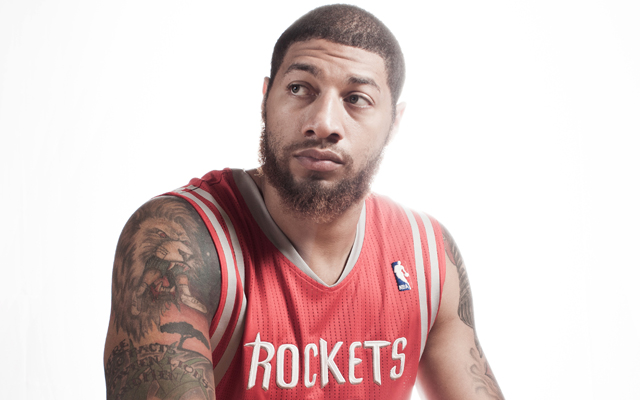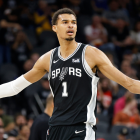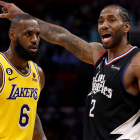 |
| Royce White is going through something a lot of people do. (Getty Images) |
When people ask, I've compared it to having your mind be an engine with the accelerator to the floor while the car, your body, is stuck in a parked garage. I've made parallels to dams trying to hold back floodwaters, current surging in a lightning storm, and trying to catch fireflies with a fishing net.
But the reality of the matter is that trying to explain to someone without them what a panic attack feels like is nearly impossible. When I started having them at 18, I had no idea what was happening. That, of course, makes the panic worse. You don't know what's happening to your body or why. You think you're losing your mind, or you're dying. Dying is a common theme.
For me, it's just the inescapable fear that everything is over, nothing is OK, I'm not going to get through this. Why can't I form a complete sentence or really even a complete thought? Why is my left hand twitching uncontrollably? Are my eyes dilated? WHAT IS HAPPENING?!
I tend to look down when they happen in public, afraid someone will notice I'm completely freaking out and bring more attention to the fact that I am freaking out, man.
They last anywhere between five minutes and an hour. I went to the doctor and he asked a few more questions about how I live my day-to-day life, then I saw a specialist. Once you get the diagnosis it actually feels a little bit better. You're not dying, you're not psychotic. You just have anxiety disorder.
You learn to recognize the signs, but it took me until my mid-20s to really be able to handle them. To know when to put yourself in a position where you don't have to drive or work. To focus on breathing and, in my case, basketball. I have to focus on something that isn't THE WORLD, which is coming to get me.
I think about lineups, and trades. I think about the pick-and-roll and whether adding muscle to a guy will help or hurt him. I think about coaching systems, chemistry, Steve Nash's bounce pass and Ray Allen's outside stroke. Sometimes it helps. Sometimes it doesn't.
When I heard that Royce White suffered from anxiety disorder, I squirmed a bit in my seat. White can help bring more attention to the issue, but the risk is that what he experiences will speak for what everyone goes through.
That's something you learn early on isn't true. Everyone experiences it differently. A close family member of mine struggles with an impending fear of death, and he runs the risk of hyperventilation and passing out. Some have their attacks go on for hours, or even a day -- a hell I can't even imagine -- and some get them for 30 seconds or so.
Panic attacks are like snowflakes that suck. They're all different.
The anxiety isn't limited to the attacks; those are just the worst part. I have an elevated heart rate and high blood pressure when I walk into a new social situation of any kind. And not like the normal level of arousal. My heart's like a kick drum. I talk even faster than normal. You can understand how this can pose a challenge when you have to do things like "blend in with a pack of 100 reporters and ask LeBron James a question."
White missed training camp yesterday, and Kevin McHale said he didn't know when White would return. Already there are people claiming that White is a "head case," that he won't cut it, that drafting him was a mistake by the Rockets.
(Additionally, I don't know White. I have no idea if he has "character issues." I can only tell you that this condition is not a reflection of my character or anyone else's.)
Well, I'm here to tell you ... none of us have any idea. He might not make it; I'm not ruling it out. Because I'm not going to go on some rah-rah kick about how White can learn to deal with this, can become a great player, and show everyone they were wrong. Of course I hope that's the case. I'd hope for that for anyone.
But no one except White knows exactly what he goes through, and no one can really know if he'll be able to handle the stress in order to deal with it. There are so many things that go into a rookie being successful, and that's before you get to something like his anxiety. He's got to become a great ballplayer first, and he has a lot of hurdles in his way.
The point here, is that everyone who has heightened anxiety deals with it differently. Triggers for people with panic attacks are completely separate. When I thought about White trying to get acclimated to NBA life, my concern wasn't for him stepping up and hitting free throws with the game on the line. He's done that. That's in the context of something he can lose himself in, the least likely place for him to have an episode.
But the idea of meeting new teammates and coaches, with more experience, high expectations, little sympathy and then having to deal with the media? I got a little twitchy just sitting here thinking about it from my comfy chair.
The biggest thing to understand about White's situation is something that coaches hammer as a cliche over and over again. It's a process. Learning to deal with my anxiety took me a decade. It's still a problem at times. I don't let it affect my work, or my personal life. It's just something you work at, and what White's doing is what he needs to: working at it.
A young writer I work with asked me the other day how I cope with an attack and what are some ways I deal with it to get through it.
"The first thing you have to do is understand who you are," I said, "and say to yourself, 'I'm someone who deals with anxiety and has panic attacks. I'm having one now, but it will pass, and when it's over, I will still be able to be everything I want to.'"
And if what's happening with White now is part of that process, I say we let him go through that, and maybe make some of those realizations about White ourselves.

















